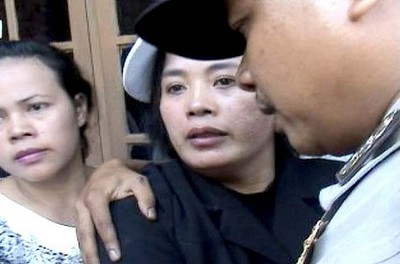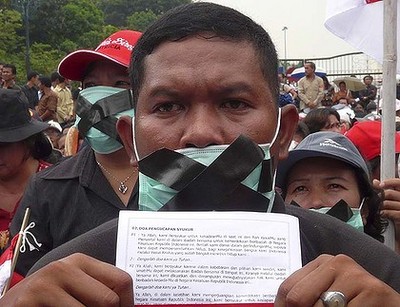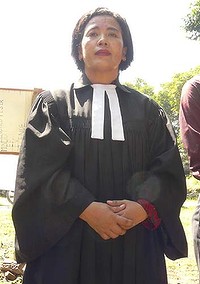 Indonesian Pastor Luspida Simanjuntak says as a little girl, she wanted to be a soldier. Instead she became a preacher.
Indonesian Pastor Luspida Simanjuntak says as a little girl, she wanted to be a soldier. Instead she became a preacher.
Now, she’s having to be both.
But the soldiering is done in prayer – on her knees – since she is facing a foe that is beyond her human strength to conquer.
She is the pastor of a small congregation in Bekasi, a suburb of Indonesia’s capital, Jakarta. Recently she was followed by Australian journalist Jock Cheetham of the Sydney Morning Herald, who had heard of her troubles.
“Luspida dresses and drives through the narrow streets,” he wrote. “Outside town she parks and walks up the pot-holed street with her Protestant congregation to land they own next to rice fields.”
On Sundays past, a wall of Muslim protesters greeted the Christians. Loudspeakers blared. Protest leaders told Luspida that the Christians should not worship here.
So far, violence has been avoided. But Luspida’s small congregation has nowhere to worship.
Last year the local Muslim-dominated government closed down her Huria Kristen Batak Protestan Church and gave the congregation another site, which the members did not accept. They instead chose to worship on property they had already purchased outside of town in another Muslim village, Ciketing.
However, Ciketing’s Muslim officials denounced that plan – and said they would prevent the congregation from moving there.
So far, they have done just that.
 “It’s very difficult to build a new church,” says Gomar Gultom, an Indonesian Christian leader. “Even the old churches they try to disturb and they ask to close. We can say there’s a new kind of Muslim here in Indonesia, a fanatical and fundamentalistic.”
“It’s very difficult to build a new church,” says Gomar Gultom, an Indonesian Christian leader. “Even the old churches they try to disturb and they ask to close. We can say there’s a new kind of Muslim here in Indonesia, a fanatical and fundamentalistic.”
“Nearly nine in 10 Indonesians are Muslim,” reported Cheetham, “while more than 20 million Christians live in the country of 240 million, the vast majority living peacefully side by side.”
The human rights monitor Setara Institute for Democracy and Peace recorded an increase in violations of religious freedom involving Indonesian churches last year – up to 75 – about four times the rate of the previous three years.
That number includes 43 incidents such as closures and attacks on churches. The deputy chairman of Setara Institute, Bonar Naipospos, says: “The government didn’t do anything to stop this.” The inaction of Indonesia’s president, Susilo Bambang Yudhoyono, is disturbing to those Indonesians who support religious freedom, tolerance and pluralism.
Early in February, Muslim mobs burnt churches in Java in protest against a prison term imposed on a Christian who had blasphemed against Islam. The crowd wanted him executed.
“Luspida trained for the ministry and became a pastor in 2001,” writes Cheetham. “Two years later she moved to Bekasi, where she lives with her two children. Her husband, a sailor, is often away.
 “In Bekasi, Luspida sits in front of the altar in her closed church. The fans blow hot air around. The pastor, 38, was born in North Sumatra, in a multi-religious community. ‘I went to Sunday school,’ she says. ‘We sang together, prayed, and went home together. We lived peacefully with Muslims, never in conflict.'”
“In Bekasi, Luspida sits in front of the altar in her closed church. The fans blow hot air around. The pastor, 38, was born in North Sumatra, in a multi-religious community. ‘I went to Sunday school,’ she says. ‘We sang together, prayed, and went home together. We lived peacefully with Muslims, never in conflict.'”
To read Cheetham’s full account of what she is enduring, click here.
“We believe in God, so we are optimistic about everything because we are part of God’s creatures,” she says.
But it is not easy for her.
Will you pray for Luspida? Her situation is difficult.
But she says God is able.

